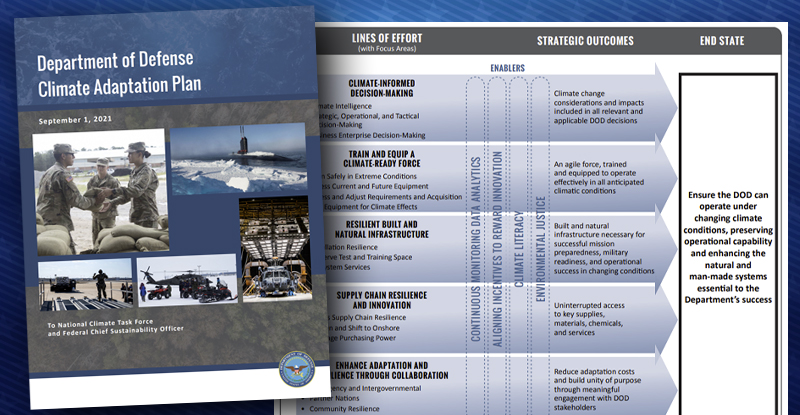By Scott Sturman, USAFA ’72
STARRS Board of Advisors
and
Doug Goodman, USAFA ’72
In 1988 the United Nations established the Intergovernmental Panel on Climate Change (IPCC) to advance scientific knowledge about climate change caused by human activity.
Relying on the IPCC’s Assessment Reports, the 2016 Paris Climate Accords established the goal of achieving by 2050 a balance between CO2 emissions and sequestration, referred to as NetZero.
In January 2021 President Biden issued Executive Order 14008 calling on all federal agencies, including DOD, to prioritize climate change in all strategy, planning, and programming activities.
In September 2021 the DOD issued its “Climate Adaptation Plan,” followed in April 2023 by the “Plan to Reduce Greenhouse Gas Emissions,” where the Net Zero goal was addressed.
The Department of Defense’s Climate Adaptation Plan accepts the IPCC’s Assessment Reports as its foundation for recommending mitigation programs without question or critical analysis.
Committing hundreds of billions of dollars to climate change programs that are generated by a politically motivated international committee is negligent, damaging to national security, and puts the lives of members of the armed forces in needless jeopardy by resorting to unproven and unreliable technologies.
America’s enemies are under no illusion that attaining Net Zero will ensure military dominance and success on the battlefield. They understand Sun Tzu’s admonition, “Let your plans be dark and impenetrable as night, and when you move, fall like a thunderbolt.”
To openly commit to a decades long doctrine that bases a nation’s war fighting capabilities and ultimate survival on untested technologies, affords opponents enormous advantages.
The charter, findings, and recommendations of IPCC’s Assessment Reports must be challenged. The founding charter requires that the IPCC accentuates “man-made” causes of climate change and minimizes natural causes which are routinely dismissed or simply ignored.
While much of the technical analysis is valid, the definitive recommendations found in the “Summary for Policy Makers” are generated, not by scientists, but by political appointees who modify technical findings to align with the preferred narrative.
The central findings in the supporting volumes are based on unvalidated and flawed computer models which cannot generate accurate short-term forecasts using known input data and results.
These computer models are not solely science-based but are highly parameterized constructs where modelers constantly adjust the inputs to generate the desired outputs.
Implementing none of the IPCC’s Net Zero recommendations, and allowing atmospheric CO2 to double, is one of IPCC’s worst case climate scenarios.
The foundational laws of thermodynamics and electromagnetism that govern the manner in which CO2 absorbs and releases energy were derived by the legends of physics—Planck, Schwarzschild, Stefan, and Boltzmann. Using their equations, a doubling of atmospheric CO2 from present levels causes a < 0.7°C rise in global temperatures—an observation that aligns with satellite measurements not used by the IPCC.
In order for IPCC models to predict catastrophic increases of global temperature of >3°C, climate modelers adjust these computations upwards by at least a factor of 4. This arbitrary manipulation is rationalized by employing non observable positive feedback loops.
On the contrary, thermodynamic and atmospheric observations demonstrate that natural systems are governed by negative, not positive, feedback loops, which are protective and prevent uncontrolled escalations of temperature.
DOD policy is fixated on a goal that will imperceptibly affect the world’s climate—reducing fossil fuel emissions and achieving a NetZero by 2050.
Currently, the DOD produces only 1% of the United States’ CO2 emissions, which in turn is responsible for 13% of the world’s total.
Even if the DOD achieves Net-Zero, eliminating 0.13% of the world’s CO2 output would not detectably reduce global temperatures.
The DOD must immediately suspend all climate adaptation programs, then on a program-by-program basis, provide an independent report on the scientific basis justifying the proposed mitigation effort.
First published on Armed Forces Press








Leave a Comment